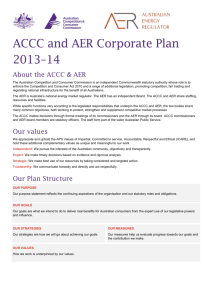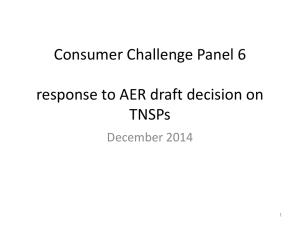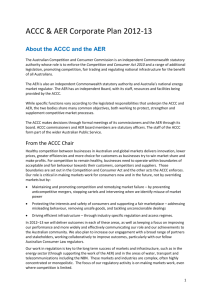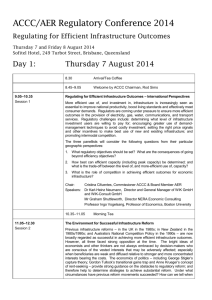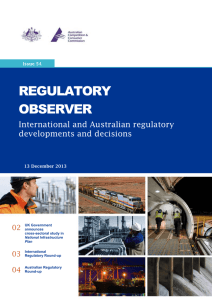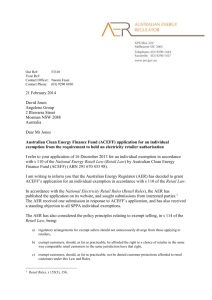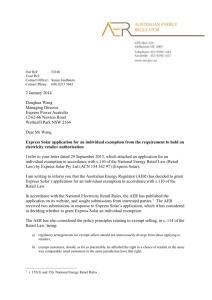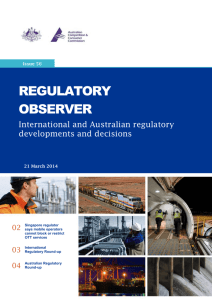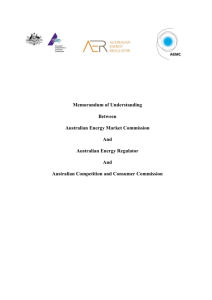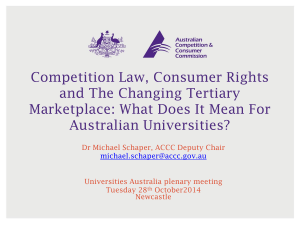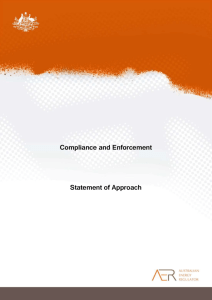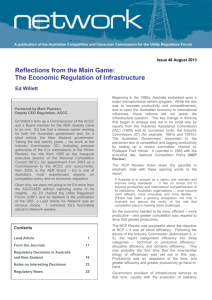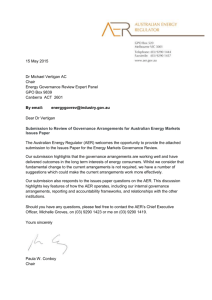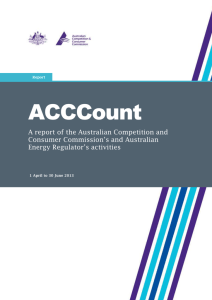ACCC and AER - Australian Energy Regulator
advertisement
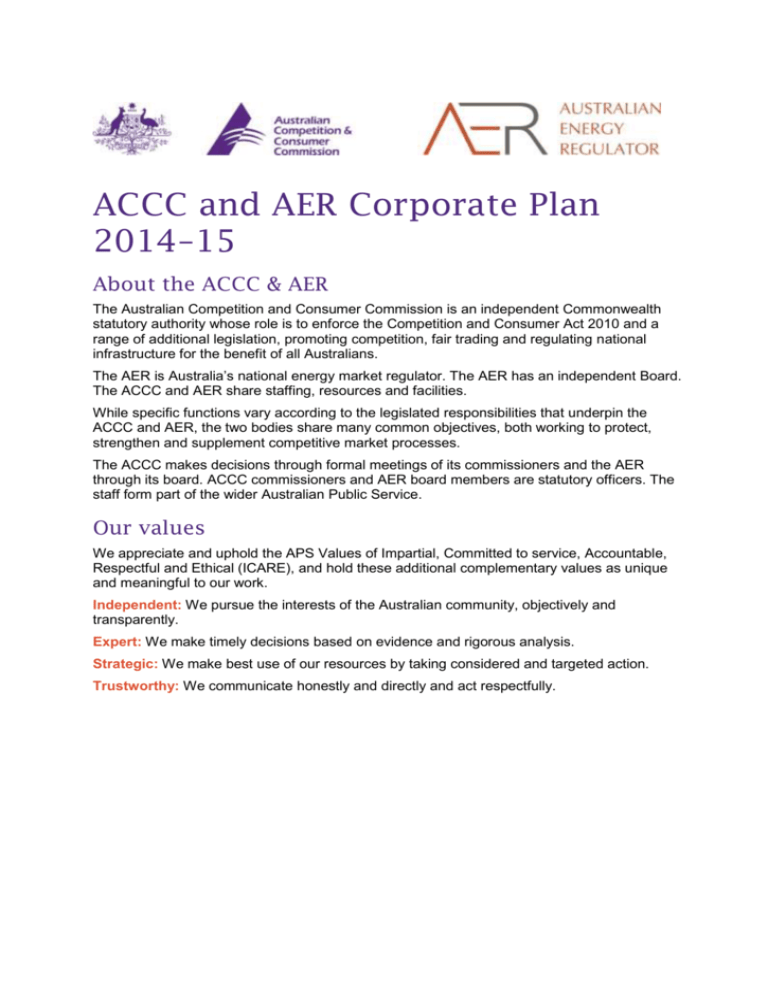
ACCC and AER Corporate Plan 2014–15 About the ACCC & AER The Australian Competition and Consumer Commission is an independent Commonwealth statutory authority whose role is to enforce the Competition and Consumer Act 2010 and a range of additional legislation, promoting competition, fair trading and regulating national infrastructure for the benefit of all Australians. The AER is Australia’s national energy market regulator. The AER has an independent Board. The ACCC and AER share staffing, resources and facilities. While specific functions vary according to the legislated responsibilities that underpin the ACCC and AER, the two bodies share many common objectives, both working to protect, strengthen and supplement competitive market processes. The ACCC makes decisions through formal meetings of its commissioners and the AER through its board. ACCC commissioners and AER board members are statutory officers. The staff form part of the wider Australian Public Service. Our values We appreciate and uphold the APS Values of Impartial, Committed to service, Accountable, Respectful and Ethical (ICARE), and hold these additional complementary values as unique and meaningful to our work. Independent: We pursue the interests of the Australian community, objectively and transparently. Expert: We make timely decisions based on evidence and rigorous analysis. Strategic: We make best use of our resources by taking considered and targeted action. Trustworthy: We communicate honestly and directly and act respectfully. Our plan structure OUR PURPOSE Our purpose statement reflects the continuing aspirations of the organisation and our statutory roles and obligations. OUR GOALS Our goals are what we intend to do to deliver real benefits for Australian consumers from the expert use of our legislative powers and influence. OUR STRATEGIES OUR MEASURES Our strategies are how we will go about achieving our goals. Our measures help us evaluate progress towards our goals and the contribution we make. OUR VALUES How we work is underpinned by our values. From the ACCC Chair The Australian Competition and Consumer Commission is about making markets work as intended–a fundamental role in our market economy. Competition brings innovation, efficiency and dynamic ways to meet consumer’s needs, but it needs the well-defined boundaries on commercial behaviour provided by competition and consumer laws to ensure it remains fair. Our role is to make these laws effective by: Maintaining and promoting competition, and remedying market failure – by preventing anti-competitive mergers, stopping cartels and intervening to stop misuse of market power Protecting the interests and safety of consumers and small businesses, and supporting a fair market place – by addressing misleading behaviour, removing unsafe goods and tackling unconscionable conduct Promoting efficient operation and use of monopoly infrastructure – through industry specific regulation and access regimes. In 2014–15 we will deliver outcomes in these three core areas of competition policy. We will maximise our effectiveness through communication and partnerships, engaging consumers, business and industry in what we are doing and why we are doing it. We will engage with fellow regulators internationally and particularly in the Asia-Pacific region. These partnerships help with specific matters, and with competition policy and practices more broadly in the region. We will also work collaboratively with our fellow Australian Consumer Law regulators to ensure this signature nationally-consistent law continues to provide fair outcomes for consumers and small businesses. We will punish those who step outside the boundaries of acceptable commercial behaviour. In regulation we will continue to exercise our responsibilities vigorously to ensure the longterm success of markets and infrastructure including in sectors like transport, water and telecommunications, including the NBN. In the energy sector, we protect consumers and support the work of the AER. We continue to develop and use our deep expertise of these complex industries to ensure that, while highly concentrated or monopolistic, the infrastructure is used efficiently and effectively serving the bests interests of the nation. Playing such an important role in our market economy we must remain a high performing agency and so continue to improve our performance. This year we will concentrate on our efficiency, our governance, our financial performance and making the best use of our expert staff. We will deliver results by developing our people and improving our processes to remain an effective agency working to benefit the Australian community. From the AER Chair The work of the AER encompasses oversight of wholesale and retail electricity and gas markets and regulation of energy network infrastructure. In carrying out its functions, the AER is directed by the objectives of national energy legislation: to promote efficient investment in, and efficient operation and use of, energy services for the long term interests of energy consumers with respect to price, quality, safety, reliability and security of supply. One of our key functions is to regulate energy networks that transport energy to consumers (electricity poles and wires and gas pipelines) in accordance with energy laws and the National Electricity and Gas Rules. There have been significant reforms to energy network regulation in the last few years to promote these objectives. We published the Better Regulation network guidelines in 2013 to explain how we will apply the new energy reforms. We have commenced the most intense period of revenue/price reviews (resets) in our history. These reset processes will be the first to incorporate the Better Regulation guidelines and for the first time the AER’s Consumer Challenge Panel (CCP) will be involved to ensure decisions on network costs properly incorporate consumers’ interests. In retail markets we will gear up for the implementation of the National Energy Retail Law in Queensland on 1 July 2015 and will publish a report on our review of the hardship policies of energy retailers. We will focus on building consumer confidence in retail energy markets through our compliance and enforcement programs, engagement with customer groups and refinements to the Energy Made Easy website. Our ongoing work program covers the regulation of annual charges and reporting of the efficiency of energy networks; monitoring compliance and reporting on performance in retail and wholesale energy markets and other publications on the state of the energy market. These wider ongoing functions remain critically important and continue to account for a significant portion of our strategic analysis and operating activity. The experience and intelligence we develop while undertaking these functions allows us to contribute to policy development and the efficient operation of energy markets. We will be assisted in achieving our goals by the ACCC’s strategies to improve regulatory practices, improve processes, develop our people and improve communication. ACCC Purpose: Making markets work for consumers now and in the future Goal 1: Maintain and promote competition and remedy market failure Strategies Deliver outcomes to address harm to consumer and small business welfare through anticompetitive conduct and improve competition under the priority areas identified in the ACCC’s Compliance and Enforcement Policy. Assess and review mergers to prevent structural changes that substantially lessen competition with a particular focus on concentrated and emerging markets and markets of significance to the Australian economy. Make decisions on authorisation and notification applications and merger reviews thoroughly and efficiently and give clear guidance to merger parties, authorisation and notification applicants, and market participants. Improve the workability of emerging and evolving markets by advising on industry-specific issues and monitoring market outcomes. Measures Outcomes and impact of actions and policies to promote competition. Improved levels of effective competition and more informed and better functioning markets. Prevention of structural change in markets (particularly concentrated markets, emerging markets and markets of significance to the Australian economy) that substantially lessens competition. Goal 2: Protect the interests and safety of consumers and support fair trading in markets affecting consumers and small business Strategies Deliver outcomes to prevent and address harm arising in the priority areas identified in the ACCC’s Compliance and Enforcement Policy and to improve compliance with the Australian Consumer Law. Multiply the effectiveness of ACCC’s compliance and enforcement initiatives through an active program of stronger and managed partnerships with ACL regulators, small business commissioners and law enforcement agencies. Identify and implement nationally integrated approaches to minimise the risk of injury and death from safety hazards in consumer products. Support a vibrant small business sector, deter anti-competitive and unconscionable conduct targeted at small business, and facilitate collective conduct by small business operators where that conduct is assessed to provide a net public benefit. Empower consumers and small business to assert their rights under the Australian Consumer Law to secure fairer outcomes in the marketplace. Measures Outcomes and impact of actions to prevent or address consumer harm or unfair trading. Efficiency and effectiveness of actions to promote consumer safety and fair trading, and both consumer and small business awareness and assertion of their consumer law rights. Goal 3: Promote the economically efficient operation of, use of, and investment in monopoly infrastructure in the long term interest of end users Strategies Deliver network regulation to promote competition and meet the long-term interests of endusers. Improve the workability of emerging markets by enforcing market rules and monitoring market outcomes. Respond to government requests to provide monitoring reports on industries in highly concentrated and newly deregulated or emerging markets. Improve regulatory practices and processes, including by building relationships with domestic and international regulatory agencies to leverage their experience. Measures Timely, considered and evidence-based regulatory decisions based on constructive engagement and complemented by effective enforcement and compliance activities. Timely provision of accurate advice to government including evaluating the effectiveness of frameworks such as access regimes. Accurate, targeted and accessible reports on industry and competitive conditions, including pricing practices. AER Purpose: Promoting efficient investments in, and efficient operation and use of, energy services for the long term interests of energy consumers AER-wide measures Stakeholders perceive the AER as a transparent and consultative decision making body. Write all public documents clearly and include plain English explanations. Apply a risk-based approach to compliance and monitoring activities. Investigate and close major compliance matters in a timely manner and take appropriate enforcement action. Publish the AER's annual State of the Energy Market Report. Goal 1: Delivering better network regulation Strategies Promote efficient investment in, and efficient operation and use of, energy services for the long term interests of consumers. Implement network guidelines that cover how the AER: o o o o assesses the regulated return on capital scrutinises network businesses' expenditure proposals encourages efficient investment engages consumers in the regulatory process. Develop benchmarking of network businesses. Consult widely, including closely involving consumers in the regulatory processes. Gain advice from the newly established Consumer Challenge Panel. Make transparent decisions within statutory time limits. Measures Decisions consistent with the legislative framework and made within statutory time limits. All stakeholders provided with an adequate opportunity to actively participate and engage in regulatory processes. Publish regulatory decisions that clearly set out how we accounted for stakeholder views, including those of the Consumer Challenge Panel. Regulatory decisions draw on improved data systems, information requirements, analysis techniques and metrics. Draw on increased in-house technical expertise, including engineering capabilities. Publish the first annual benchmarking report. Goal 2: Build consumer confidence in retail energy markets Strategies Promote a culture of regulatory compliance by energy businesses, including through compliance monitoring activities, investigations and reviews. Monitor and report on retail energy markets and the performance of retailers active in those markets. Assess applications for entry into the retail energy market and provide guidance to potential applicants so that authorised retailers and exempt sellers are aware of and can meet their obligations under the Retail Law. Enhance the functionality of the Energy Made Easy website to provide consumers with additional tools to assist them navigate the retail energy market and understand their rights and available retail energy offers. Measures Undertake compliance and enforcement activities that improve market outcomes for consumers. Accurate, timely and accessible reports on the performance of the energy market within six weeks of the data being available. Assess applications from businesses to become energy retailers or grant an exemptions from the requirement within 12 weeks of the receipt of all relevant information. Clear, accurate and accessible information for consumers on energy retail markets, through the Energy Made Easy website. Goal 3: Supporting the efficient operation of energy markets Strategies Promote more efficient, competitive, transparent and secure energy wholesale and retail markets through compliance monitoring activities, investigations and reviews. Take effective, targeted and timely enforcement action when necessary, and promote best practice through compliance publications and audits. Report on market activities and pricing outcomes to detect consumer harm, market irregularities and manipulation Publish information on energy markets. Measures Publish quarterly compliance reports within six weeks of the end of the relevant quarter. Conduct audits of participant systems that are critical to market efficiency and energy security. Conduct a series of targeted compliance reviews. Report on outcomes in gas spot markets in Victoria, STTM and the Wallumbilla Hubs. Publish reports on extreme price events in the NEM and significant price variations in spot gas markets, within statutory timeframes. ACCC and AER Goal 4: Increase our organisational effectiveness through a commitment to our people, planning, systems and stakeholder engagement. Strategies Build organisational capability and knowledge sharing with well trained and supported people. Promote a safe, healthy and respectful work environment for our people. Streamline our management of projects by using the skills and experience of our people. Transform our specialist legal and economic services to increase the effectiveness of our operations. Transform our corporate support services and systems to increase the effectiveness of our operations. Implement a comprehensive strategy that supports our goals to ensure effective communication with our diverse audiences. Lessen the compliance burden on business by investigating and implementing options for reducing regulation (red tape) while maintaining or improving regulatory outcomes. Measures Extent to which our people’s and our organisational capability has been enhanced. Effectiveness of the ACCC and AER’s governance arrangements in enabling strategic decision making and in supporting compliance with our obligations. Effectiveness and use of ACCC and AER web sites, other media and campaign materials, in raising awareness of the role, purpose and responsibilities of the ACCC and AER. Actions pursued through public and private sector partnerships to improve consumer and small business welfare. Impact and quantity of national and international advocacy and cooperation initiatives and technical assistance with an increased focus on the Asian region. Reduced cost of regulation to business
